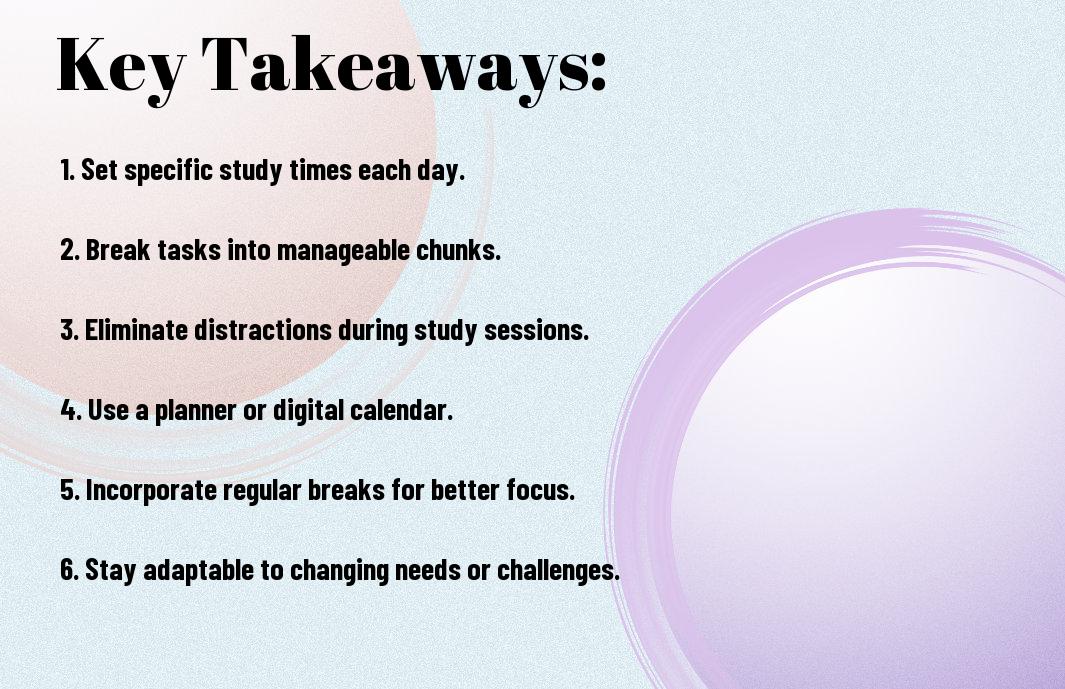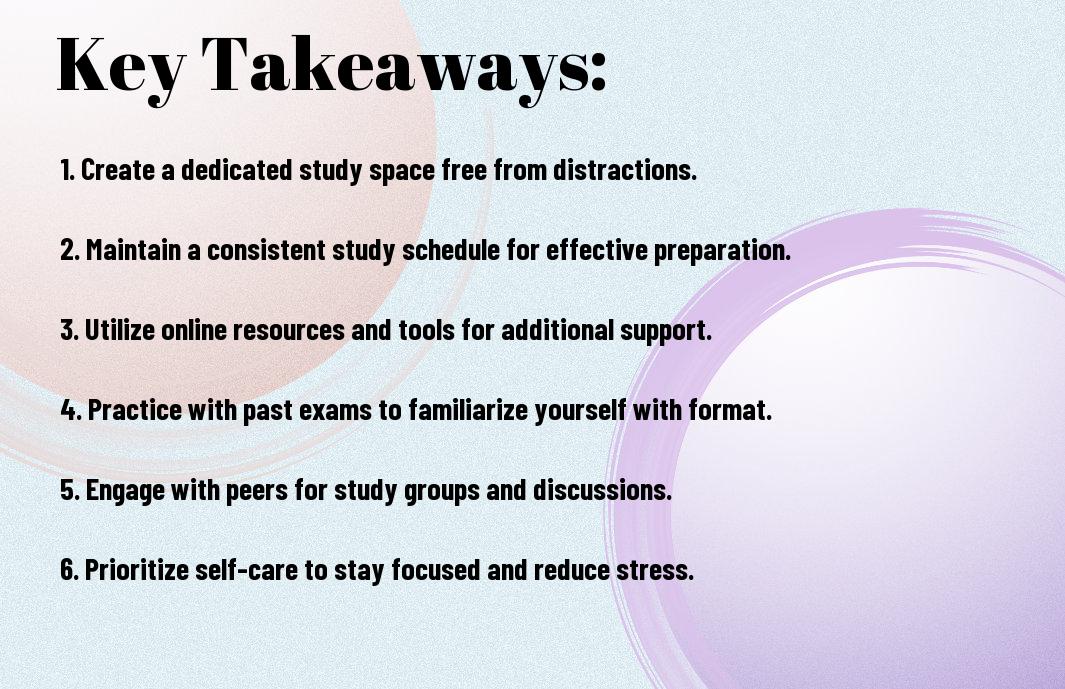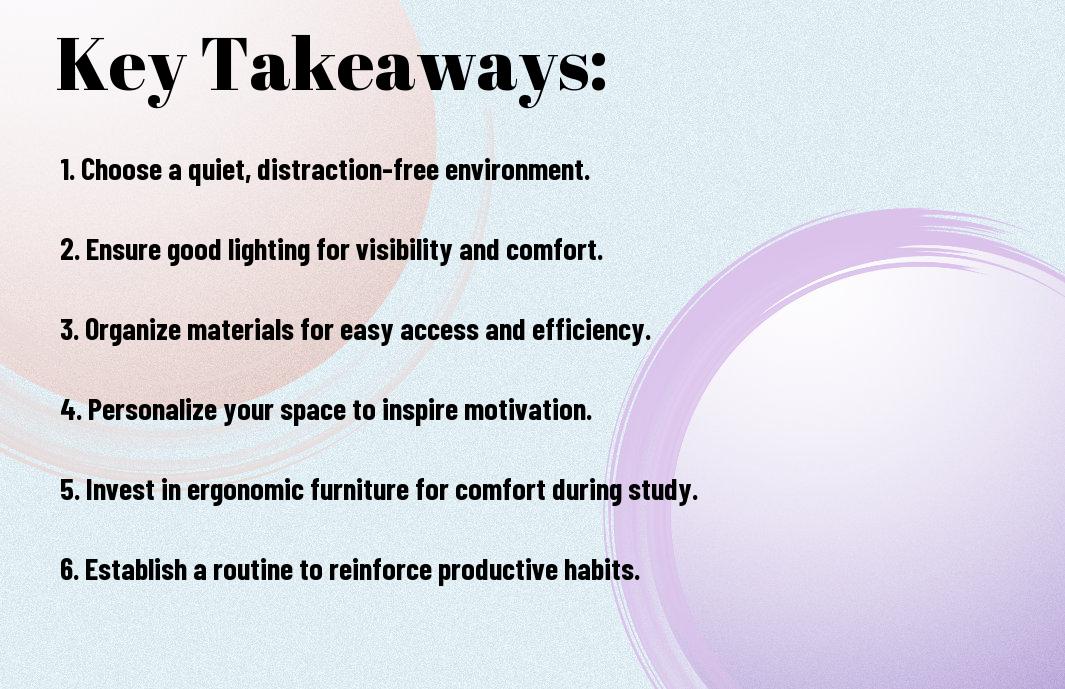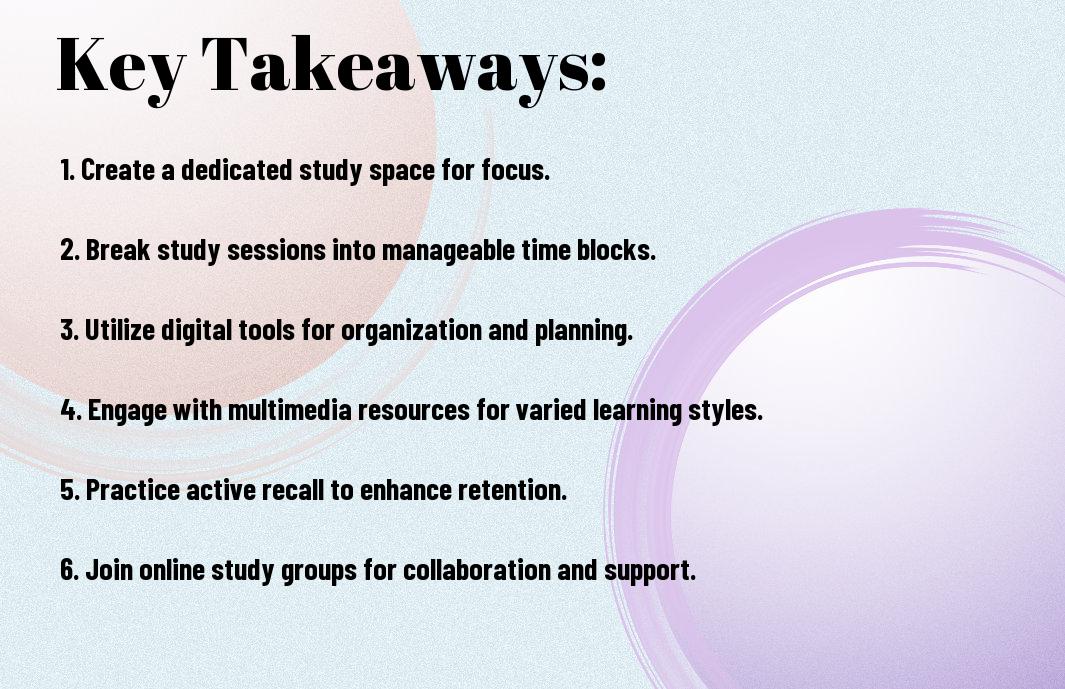As you commence on your online educational journey, you will need to establish a study routine that suits your needs. You will have to balance your daily life with your academic obligations, and your ability to manage your time effectively will be key to your success. Your goal is to create a schedule that allows you to stay on top of your coursework, without feeling overwhelmed. In this guide, you will learn how to do just that, and set yourself up for achievement in your online studies.
Key Takeaways:
To succeed in online education, establishing a well-structured study routine is crucial. Here are the key points to consider:
- Set specific goals and objectives for each study session to help you stay focused and motivated.
- Create a schedule that balances study time with other activities, allowing for flexibility and breaks to avoid burnout.
- Choose a dedicated study space with minimal distractions, ensuring you can concentrate on your online coursework.
- Utilize technology strategically, leveraging tools and resources that enhance your learning experience, such as video lectures and online forums.
- Establish a routine for reviewing and practicing what you’ve learned, reinforcing your understanding and retention of the material.
Setting Goals
Your academic success in online education depends on setting clear objectives. You can start by defining what you want to achieve and creating a schedule to help you stay on track. For guidance on Planning a Better Study Schedule, visit this resource to learn more.
Defining Academic Objectives
About your goals, consider what you want to accomplish in your online courses. You should identify your strengths and weaknesses to set realistic targets, allowing you to focus your efforts and make the most of your study time.
Creating a Study Schedule
Study habits vary, but a well-structured schedule helps you stay organized. You can allocate specific times for learning, reviewing, and practicing, ensuring a balanced approach to your online education.
Indeed, creating a study schedule is an ongoing process that requires regular adjustments. As you progress through your courses, you will need to assess your progress, identify areas for improvement, and make changes to your schedule to optimize your learning experience. You should prioritize your tasks, set achievable milestones, and use time-management tools to stay on track and maintain a healthy work-life balance.

Choosing Online Resources
Now that you have set your goals, it’s time to choose the right online resources to support your learning. You will need to select relevant course materials and utilize digital tools and platforms to stay organized and focused.
Selecting Relevant Course Materials
Beneath the surface of online education lies a wealth of resources, and you must sift through them to find the materials that align with your needs. You should look for courses and materials that are accredited and have good reviews from other students.
Utilizing Digital Tools and Platforms
About the various digital tools available, you have numerous options to consider, including learning management systems, online libraries, and collaboration software. You should explore these tools to determine which ones work best for your learning style and needs.
Platforms such as online course providers, educational apps, and virtual classrooms can provide you with a structured learning environment and access to a wide range of resources. You can use these platforms to access video lectures, interactive tutorials, and online discussions, helping you to stay engaged and motivated throughout your online education journey.
Creating a Conducive Learning Environment
Not all study spaces are created equal, and you must carefully consider your surroundings to optimize your learning experience. You will be more focused and productive when your environment is quiet, comfortable, and free from distractions.
Eliminating Distractions and Minimizing Procrastination
Eradicating distractions is vital to maintaining your focus, and you can achieve this by turning off your phone, finding a quiet space, and using tools that help you stay on track.
Setting Up a Dedicated Study Space
Acquiring a dedicated study space is vital, and you should choose a area that is quiet, comfortable, and equipped with the necessary resources, allowing you to concentrate and retain information more effectively.
Learning in a dedicated space helps you associate that space with studying, making it easier to get into a productive mindset. You can enhance your study space by adding a desk, chair, and good lighting, creating an environment that fosters focus and productivity, allowing you to make the most of your online education.
Developing Effective Study Habits
All successful online students develop a set of habits that help them stay focused and motivated. You will need to identify what works best for you and stick to it. Your routine should include dedicated time for studying, regular breaks, and a quiet workspace.
Active Learning Techniques and Strategies
Above all, you should engage with the material you are studying. You can use flashcards, make concept maps, or discuss topics with your peers to deepen your understanding and stay engaged.
Managing Time and Prioritizing Tasks
At the start of each week, you should plan out your tasks and set achievable goals. You will need to allocate specific times for studying, attending virtual classes, and completing assignments to stay on track.
Effective time management is key to your success in online education. You will need to balance your study schedule with other aspects of your life, such as work or family commitments. By prioritizing your tasks and avoiding procrastination, you can make steady progress and achieve your academic goals. You should also learn to say no to non-crucial activities that can derail your study plans.

Staying Motivated and Engaged
Many online students face challenges in staying motivated. To overcome this, you can visit How to Make an Effective Study Plan – Campus Resources for guidance. By following these tips, you will be able to create a study routine that keeps you engaged and motivated throughout your online education journey.
Building a Support Network and Community
Remaining connected with your peers and instructors is vital. You can join online forums, discussion groups, and social media platforms to build a support network and community that will help you stay on track and motivated.
Tracking Progress and Celebrating Achievements
Above all, monitoring your progress is key to staying motivated. You can use a planner, spreadsheet, or mobile app to track your progress and celebrate your achievements along the way.
Progress is a significant aspect of your online education journey. As you track your progress, you will be able to identify areas where you need improvement and make adjustments to your study routine accordingly. By celebrating your achievements, you will stay motivated and encouraged to continue working towards your goals. You can set small rewards for yourself when you reach certain milestones, which will help you stay focused and driven throughout your online education journey.
Overcoming Challenges and Obstacles
Despite the flexibility of online education, you will inevitably face challenges. Developing a study routine helps you stay on track and overcome these obstacles, ensuring your success in online courses.
Identifying and Addressing Learning Gaps
Beneath the surface of your study routine, you must identify areas where you need improvement. By recognizing your learning gaps, you can adjust your routine to focus on those topics, strengthening your understanding and improving your overall performance.
Seeking Help and Resources When Needed
Obviously, obstacles will arise, and you may need additional support. Your online institution likely offers resources such as tutoring or online forums where you can seek help from instructors or peers.
With these resources at your disposal, you can overcome the hurdles that stand in your way. You can access online tutorials, video lectures, and discussion forums to clarify concepts and gain a deeper understanding of the subject matter, allowing you to refine your study routine and stay on track to achieve your academic goals.
Final Words
With this in mind, you now have the tools to create a study routine that suits your needs. You can tailor your schedule to fit your learning style, making your online education experience more efficient. By sticking to your routine, you will be able to stay on track and achieve your academic goals. Your dedication and persistence will ultimately determine your success in online education.
FAQ
Q: What are the initial steps to create an effective study routine for online education?
A: To create an effective study routine for online education, start by setting clear goals for what you want to achieve. Identify your strengths and weaknesses, and assess the time you have available for studying. Make a list of the courses or topics you need to cover, and break them down into manageable chunks. Create a dedicated study space that is quiet, comfortable, and free from distractions. Establishing a routine also involves deciding on the best time of day for you to study, and how long each study session should be. Use a planner, calendar, or app to schedule your study sessions and stick to your plan.
Q: How can I stay organized and motivated while following my online education study routine?
A: Staying organized involves keeping track of your study materials, including notes, readings, and assignments. Use digital tools like folders, tags, and bookmarks to keep your resources in order. To stay motivated, set small rewards for yourself after reaching certain milestones. Connect with fellow students or join online study groups for support and discussion. Regularly review your progress, adjust your study routine as needed, and celebrate your achievements. It’s also helpful to establish a routine that includes regular breaks, exercise, and healthy eating to maintain your physical and mental health.
Q: What strategies can I use to optimize my study sessions for better learning outcomes in online education?
A: To optimize your study sessions, use the Pomodoro Technique, which involves studying in focused 25-minute increments, followed by a 5-minute break. This technique can help you stay focused and avoid burnout. Active learning strategies, such as summarizing notes in your own words, creating concept maps, or making flashcards, can also enhance your understanding and retention of the material. Additionally, engage with the course content by asking questions, participating in online discussions, and seeking help when needed. Reviewing material regularly, rather than cramming, can also significantly improve your learning outcomes. Use technology to your advantage by exploring different study apps, videos, and podcasts that can supplement your learning.







